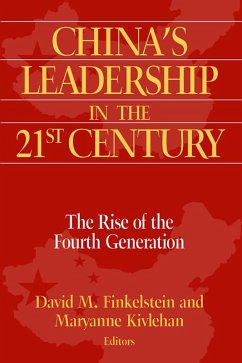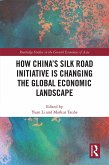David M. Finkelstein, Maryanne Kivlehan
China's Leadership in the Twenty-First Century (eBook, ePUB)
The Rise of the Fourth Generation
23,95 €
23,95 €
inkl. MwSt.
Sofort per Download lieferbar

12 °P sammeln
23,95 €
Als Download kaufen

23,95 €
inkl. MwSt.
Sofort per Download lieferbar

12 °P sammeln
Jetzt verschenken
Alle Infos zum eBook verschenken
23,95 €
inkl. MwSt.
Sofort per Download lieferbar
Alle Infos zum eBook verschenken

12 °P sammeln
David M. Finkelstein, Maryanne Kivlehan
China's Leadership in the Twenty-First Century (eBook, ePUB)
The Rise of the Fourth Generation
- Format: ePub
- Merkliste
- Auf die Merkliste
- Bewerten Bewerten
- Teilen
- Produkt teilen
- Produkterinnerung
- Produkterinnerung

Bitte loggen Sie sich zunächst in Ihr Kundenkonto ein oder registrieren Sie sich bei
bücher.de, um das eBook-Abo tolino select nutzen zu können.
Hier können Sie sich einloggen
Hier können Sie sich einloggen
Sie sind bereits eingeloggt. Klicken Sie auf 2. tolino select Abo, um fortzufahren.

Bitte loggen Sie sich zunächst in Ihr Kundenkonto ein oder registrieren Sie sich bei bücher.de, um das eBook-Abo tolino select nutzen zu können.
Between Fall 2002 and Spring 2003, most of the national leadership of China's party, state and military will be replaced by a new generation of officials. The accession to power of this "Fourth Generation" leadership will have profound implications. This is an introduction to the new leaders.
- Geräte: eReader
- mit Kopierschutz
- eBook Hilfe
- Größe: 21.59MB
Andere Kunden interessierten sich auch für
![Israel-Asia Relations in the Twenty-First Century (eBook, ePUB) Israel-Asia Relations in the Twenty-First Century (eBook, ePUB)]() Israel-Asia Relations in the Twenty-First Century (eBook, ePUB)42,95 €
Israel-Asia Relations in the Twenty-First Century (eBook, ePUB)42,95 €![Belarus in the Twenty-First Century (eBook, ePUB) Belarus in the Twenty-First Century (eBook, ePUB)]() Belarus in the Twenty-First Century (eBook, ePUB)42,95 €
Belarus in the Twenty-First Century (eBook, ePUB)42,95 €![New Confucianism in Twenty-First Century China (eBook, ePUB) New Confucianism in Twenty-First Century China (eBook, ePUB)]() Jesus Sole-FarrasNew Confucianism in Twenty-First Century China (eBook, ePUB)48,95 €
Jesus Sole-FarrasNew Confucianism in Twenty-First Century China (eBook, ePUB)48,95 €![Towards a New Development Paradigm in Twenty-First Century China (eBook, ePUB) Towards a New Development Paradigm in Twenty-First Century China (eBook, ePUB)]() Towards a New Development Paradigm in Twenty-First Century China (eBook, ePUB)57,95 €
Towards a New Development Paradigm in Twenty-First Century China (eBook, ePUB)57,95 €![Twenty-First Century Bollywood (eBook, ePUB) Twenty-First Century Bollywood (eBook, ePUB)]() Ajay GehlawatTwenty-First Century Bollywood (eBook, ePUB)40,95 €
Ajay GehlawatTwenty-First Century Bollywood (eBook, ePUB)40,95 €![How China's Silk Road Initiative is Changing the Global Economic Landscape (eBook, ePUB) How China's Silk Road Initiative is Changing the Global Economic Landscape (eBook, ePUB)]() How China's Silk Road Initiative is Changing the Global Economic Landscape (eBook, ePUB)46,95 €
How China's Silk Road Initiative is Changing the Global Economic Landscape (eBook, ePUB)46,95 €![Rethinking the Decline of China's Qing Dynasty (eBook, ePUB) Rethinking the Decline of China's Qing Dynasty (eBook, ePUB)]() Daniel McMahonRethinking the Decline of China's Qing Dynasty (eBook, ePUB)49,95 €
Daniel McMahonRethinking the Decline of China's Qing Dynasty (eBook, ePUB)49,95 €-
-
-
Between Fall 2002 and Spring 2003, most of the national leadership of China's party, state and military will be replaced by a new generation of officials. The accession to power of this "Fourth Generation" leadership will have profound implications. This is an introduction to the new leaders.
Dieser Download kann aus rechtlichen Gründen nur mit Rechnungsadresse in A, B, BG, CY, CZ, D, DK, EW, E, FIN, F, GR, HR, H, IRL, I, LT, L, LR, M, NL, PL, P, R, S, SLO, SK ausgeliefert werden.
Produktdetails
- Produktdetails
- Verlag: Taylor & Francis eBooks
- Seitenzahl: 312
- Erscheinungstermin: 8. April 2015
- Englisch
- ISBN-13: 9781317474913
- Artikelnr.: 42643897
- Verlag: Taylor & Francis eBooks
- Seitenzahl: 312
- Erscheinungstermin: 8. April 2015
- Englisch
- ISBN-13: 9781317474913
- Artikelnr.: 42643897
- Herstellerkennzeichnung Die Herstellerinformationen sind derzeit nicht verfügbar.
David M. Finkelstein is the Director of Project Asia, The CNA Corporation's center for Asian security studies. A long-time student of Chinese affairs, he received his Ph.D. in Chinese history from Princeton University and studied Mandarin at Nankai University in Tianjin. He is widely published on PRC and Asian security issues. A retired U.S. Army Officer, Finkelstein is a graduate of the United States Military Academy, held various China-related positions in the Pentagon, and served on the faculty of the History Department at West Point where he taught courses on the history of China and Chinese military history. Maryanne Kivlehan is an Asia Security Analyst at the CNA Corporation's Project Asia. A specialist in Chinese politics, foreign policy, and China's new generation of leaders, she also recently published an in-depth study of the political, legal, economic, environmental, and security dimensions of the South China Sea. She holds an MA in Security Policy Studies from the Elliott School of Foreign Affairs at the George Washington University, and is a graduate of the Hopkins-Nanjing Center for Chinese and American Studies, as weIl Capital Normal University in Beijing, where she studied Mandarin. Before joining the CNA Corporation, she worked for an international nonprofit organization directing projects on Chinese, Mongolian, and Russian affairs. She also spent time in Bosnia working with the Organization for Security and Cooperation in Europe (OS CE) in support of the 1997 municipal elections.
I. Introduction 1. The Rise of the Fourth Generation: Overview and
Implications. China's New Leaders 2. Poised to Take the Helm: Rising Stars
and the Transition to the Fourth Generation 21 3. Hu Jintao's Succession:
Prospects and Challenges 4. The Provinces: Training Ground for National
Leaders or a Power in Their Own Right? 5. Leading Small Groups: Managing
All Under Heaven 6. The Rote of Mishus in the Chinese Political System:
Change and Continuity 7. Where Do Correct Ideas Come From? The Party
School, Key Think Tanks, and the Intellectuals IV. Challenges to Governance
and Reform 8. From the July 1 Speech to the Sixteenth Party Congress:
Ideology, Party Construction, and Leadership Transition 9. Economics as the
Central Task: Do Entrepreneurs Matter? 10. Social Dynamics and New
Generation Politics 11. The Absent-Minded Reform of China's Media V. The
Generation After Next and Future Prospects for the CCP 12. The Generation
After Next in Chinese Politics 13. Remaining Relevant: The Challenges for
the Party in Late-Leninist China
Implications. China's New Leaders 2. Poised to Take the Helm: Rising Stars
and the Transition to the Fourth Generation 21 3. Hu Jintao's Succession:
Prospects and Challenges 4. The Provinces: Training Ground for National
Leaders or a Power in Their Own Right? 5. Leading Small Groups: Managing
All Under Heaven 6. The Rote of Mishus in the Chinese Political System:
Change and Continuity 7. Where Do Correct Ideas Come From? The Party
School, Key Think Tanks, and the Intellectuals IV. Challenges to Governance
and Reform 8. From the July 1 Speech to the Sixteenth Party Congress:
Ideology, Party Construction, and Leadership Transition 9. Economics as the
Central Task: Do Entrepreneurs Matter? 10. Social Dynamics and New
Generation Politics 11. The Absent-Minded Reform of China's Media V. The
Generation After Next and Future Prospects for the CCP 12. The Generation
After Next in Chinese Politics 13. Remaining Relevant: The Challenges for
the Party in Late-Leninist China
I. Introduction 1. The Rise of the Fourth Generation: Overview and
Implications. China's New Leaders 2. Poised to Take the Helm: Rising Stars
and the Transition to the Fourth Generation 21 3. Hu Jintao's Succession:
Prospects and Challenges 4. The Provinces: Training Ground for National
Leaders or a Power in Their Own Right? 5. Leading Small Groups: Managing
All Under Heaven 6. The Rote of Mishus in the Chinese Political System:
Change and Continuity 7. Where Do Correct Ideas Come From? The Party
School, Key Think Tanks, and the Intellectuals IV. Challenges to Governance
and Reform 8. From the July 1 Speech to the Sixteenth Party Congress:
Ideology, Party Construction, and Leadership Transition 9. Economics as the
Central Task: Do Entrepreneurs Matter? 10. Social Dynamics and New
Generation Politics 11. The Absent-Minded Reform of China's Media V. The
Generation After Next and Future Prospects for the CCP 12. The Generation
After Next in Chinese Politics 13. Remaining Relevant: The Challenges for
the Party in Late-Leninist China
Implications. China's New Leaders 2. Poised to Take the Helm: Rising Stars
and the Transition to the Fourth Generation 21 3. Hu Jintao's Succession:
Prospects and Challenges 4. The Provinces: Training Ground for National
Leaders or a Power in Their Own Right? 5. Leading Small Groups: Managing
All Under Heaven 6. The Rote of Mishus in the Chinese Political System:
Change and Continuity 7. Where Do Correct Ideas Come From? The Party
School, Key Think Tanks, and the Intellectuals IV. Challenges to Governance
and Reform 8. From the July 1 Speech to the Sixteenth Party Congress:
Ideology, Party Construction, and Leadership Transition 9. Economics as the
Central Task: Do Entrepreneurs Matter? 10. Social Dynamics and New
Generation Politics 11. The Absent-Minded Reform of China's Media V. The
Generation After Next and Future Prospects for the CCP 12. The Generation
After Next in Chinese Politics 13. Remaining Relevant: The Challenges for
the Party in Late-Leninist China







